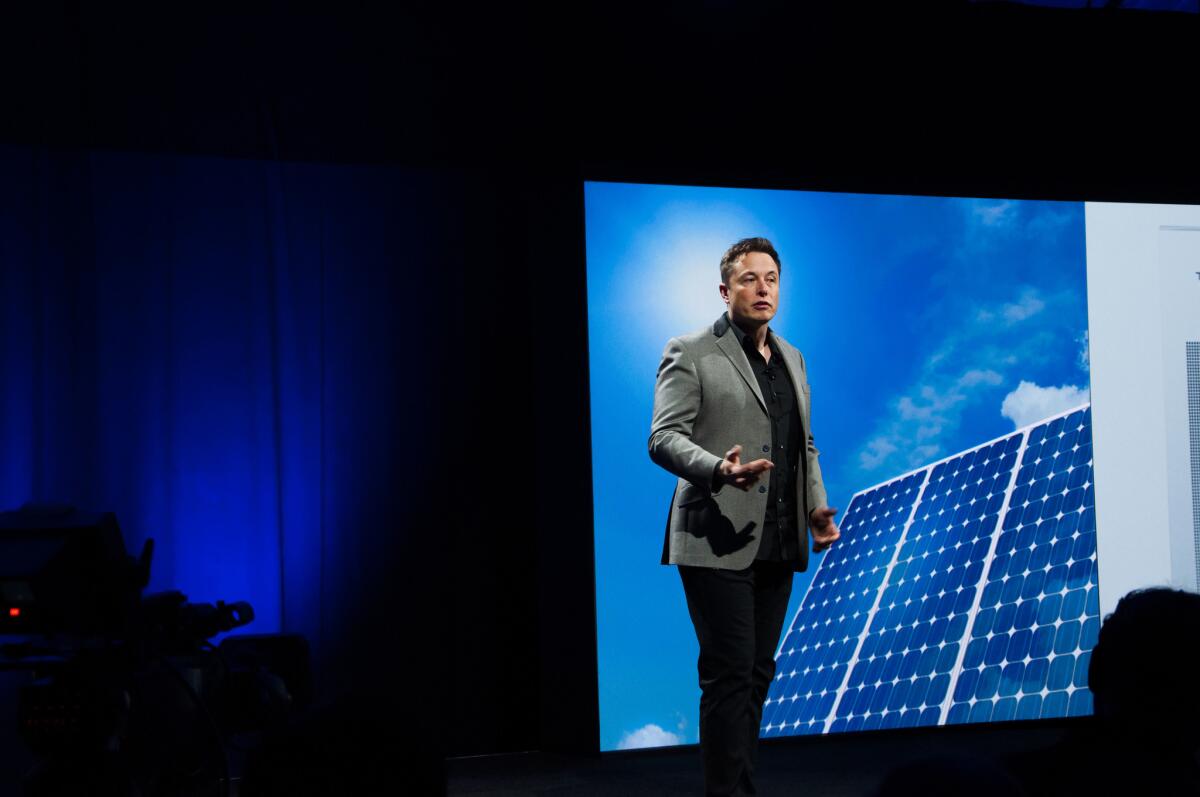Tesla’s bid to buy SolarCity is approved by shareholders, but challenges remain

Shareholders of Tesla Motors and SolarCity have handed Elon Musk the keys to what will be the world’s largest integrated green energy company, but challenges abound for the entrepreneur’s vision to transform how people power their lives.
Tesla and SolarCity shareholders on Thursday overwhelmingly approved Tesla’s acquisition of SolarCity in a stock transaction, valued at about $2 billion, that is designed to create one-stop shopping for homeowners’ power generation, energy storage and electric vehicles.
Building on Musk’s big idea approach to business, the Tesla chief executive aims to rewire the energy sector in ways that give consumers more control over how they power their homes and cars — much as changes in the telecom industry combined phone service and computers into the palm of people’s hands.
Musk’s grand plans, though, face changing political winds with the election of Donald Trump, who supports expanding fossil fuel production. A Republican administration and Congress is thought unlikely to support subsidies for renewable energy or clean vehicles, analysts have said.
Then there’s the matter of the two companies’ heavy debt, hearty appetite for cash and frequent need for fundraising.
But the billionaire investor, who is chairman and the largest shareholder in Tesla and SolarCity, brushed concerns aside.
“I think your faith will be rewarded,” Musk told shareholders at the Tesla meeting, where the company announced support for the deal by more than 85% of shares not held by Musk and affiliated investors. He promised that “some really amazing stuff will be coming out.”
Among Musk’s transformative proposals is his plan to offer glass solar shingles for homes in place of the boxy panels anchored to a million rooftops today. Musk expects to begin offering the new panels next year, first in California at a cost he says will be competitive with conventional roofs.
“It’s looking quite promising that a solar roof will cost less than a normal roof,” he told shareholders. “Would you like a roof that looks better? Why would you get anything else?”
Analysts don’t doubt Musk’s uncanny ability to envision and promote exciting products, but they question the effect on Tesla’s bottom line.
Institutional Shareholder Services, a firm that advises mutual funds and other institutional investors, had recommended the merger, but rival firm Glass Lewis & Co. called it a “thinly veiled bailout plan.” Several lawsuits have been filed challenging the transaction, and skeptics have noted that both companies face a cash-flow crunch.
At stake is the future of the leading rooftop solar company, which has increased its revenue this year yet continues to lose money.
The two companies have said that SolarCity would contribute $1 billion or more in revenue to Tesla next year and more than $500 million in cash to Tesla’s balance sheet over three years. They have projected $150 million a year in savings by combining the companies.
The question is whether that will be enough.
Efraim Levy, an analyst with CFRA Research, said Tesla’s challenge will be how to finance the expansion of Musk’s vision. The potential for increased debt or dilution of Tesla stock present negatives for the company, he said.
Levy said he sees potential to reduce costs by combining the two companies, though he said he believes some of those benefits could have been accomplished even if the two companies remained separate.
“It’s kind of like the Tesla investment in general,” Levy said. “You’re paying a lot upfront. The risk and cost are more front-end loaded with the potential benefits coming down the road, if at all.”
Finding the sweet spot in the home energy market has proved to be a challenge, in particular for rooftop solar firms. Although the price of solar panels has fallen to lows that make it a cheap source of electricity, the labor costs in the rooftop solar business have hurt profitability.
To cut costs, SolarCity entered into partnerships with companies such as home-sharing firm Airbnb to find new customers. SolarCity is offering Airbnb hosts and renters a $1,000 rebate on solar panels as a way to recruit new customers without having to pay anyone to find people to buy solar power.
Bringing under one roof all of the home energy technologies — solar panels, battery storage, smart technologies to operate appliances and an electric vehicle — is both an opportunity and a risk for Tesla, analysts say.
“It has some inherent appeal and logic,” said Shayle Kann, head of GTM Research, an energy research and consulting firm. “Whether one company needs to be the producer of all these things is the question. It’s an ambitious vision to say the least.”
Some experts are optimistic even though the future is uncertain for incentives such as the 30% federal tax credit for clean energy products that has helped drive solar power’s growth.
Patrick Currier, a partner with Beverly Hills-based consulting firm S2C Pacific and a former senior energy counsel to the House Energy and Commerce Committee, said he believes the anti-establishment wave tends to support Musk’s vision of individual energy independence.
“On the federal level, there might be some pullback in [research and development]) funding and clean energy funding,” Currier said. “I don’t think Musk’s vision is dependent on federal policy. I don’t see it being impacted by the Trump administration as long as you’re talking about private sector investment.”
That is Musk’s sentiment as well. He promised shareholders that if incentives and subsidies disappeared, his companies would be stronger.
“The incentives either don’t scale or are disadvantageous,” Musk said. “Ironically, if all incentives and subsidies were removed from Tesla, Tesla’s revenue would increase, not decrease.”
Tesla’s stock increased $4.73, or 2.6%, to $188.66 a share Thursday, before the shareholder vote was announced, and shares continued to rise slightly in after-hours trading. SolarCity was up 57 cents, or 2.9%, to $20.40 share and also continued rising in after-hours trading.
For more energy news, follow Ivan Penn on Twitter: @ivanlpenn
ALSO
OneWest Bank shut out nonwhite borrowers, advocates say
With bans of alt-right users, Twitter tests the limits of free speech
Labor union members protest affordable housing loss as an Airbnb conference starts
UPDATES:
4:35 p.m.: This article was updated with Elon Musk’s statements during the Tesla shareholder meeting as well as quotes from experts and analysts.
1:15 p.m.: This article was updated with shareholders’ approval of the deal.
This article was originally published at 4 a.m.
More to Read
Inside the business of entertainment
The Wide Shot brings you news, analysis and insights on everything from streaming wars to production — and what it all means for the future.
You may occasionally receive promotional content from the Los Angeles Times.











